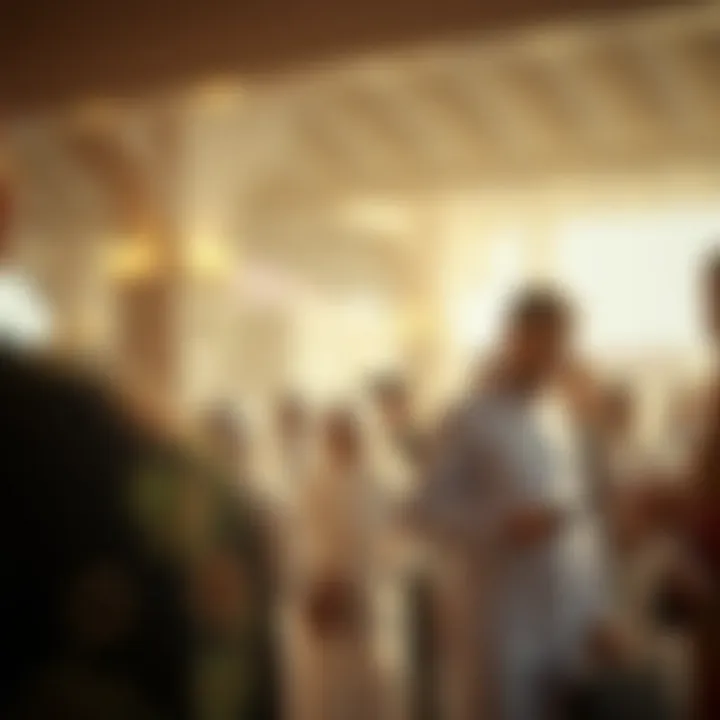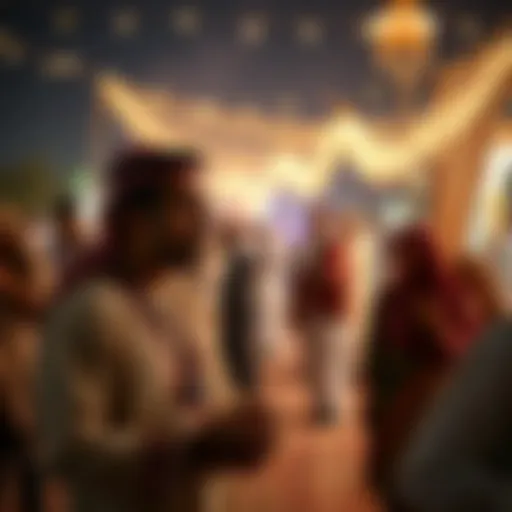Ramadan in the UAE: Cultural and Economic Insights for 2024


Intro
As the crescent moon signals the arrival of Ramadan, anticipation fills the air in the UAE. The month, steeped in tradition, offers both profound spiritual significance and practical implications on daily life. In 2024, Ramadan will start around mid-March and last until mid-April, bringing with it a rich tapestry of cultural practices and communal bonding.
Beyond its sacred traditions, Ramadan casts a long shadow on the UAE's economy, particularly in sectors like real estate. The hustle and bustle of daily life do not just pause for prayer and fasting; they adjust to embrace the spirit of giving and community. This period sees a confluence of charity, enhanced social engagement, and a peculiar shift in business operations, particularly for expats and investors navigating the dynamic landscape of Dubai's property market.
This article aims to shed light on the multiple facets of Ramadan 2024 in the UAE, encompassing its cultural relevance, economic implications, local customs, and distinctive opportunities. Through meticulous exploration, we will delve into how this holy month shapes activities and interactions, creating a unique atmosphere for both residents and investors alike.
Introductory Insights on Ramadan
Ramadan holds immense significance within the unique cultural tapestry of the UAE, which sets the stage for a variety of social and economic activities during this holy month. This introductory section aims to shed light on the major aspects of Ramadan, particularly as we approach 2024. The observations made here will serve as a foundation for understanding how this sacred period is interwoven with the daily lives of individuals and businesses alike, presenting myriad opportunities for engagement and investment.
Understanding the Essence of Ramadan
At its core, Ramadan is more than a mere fasting ritual; it embodies a time of deep reflection, spiritual connection, and community bonding. The observance of Sawm, or fasting, constitutes one of the Five Pillars of Islam, aimed at cultivating self-discipline, empathy for the less fortunate, and a heightened sense of gratitude. In the UAE, where diversity thrives, Ramadan reflects a confluence of traditions and practices influenced by different cultures residing in the country. The essence of Ramadan hugs the heart of the community, galvanizing people to come together, whether through shared meals at sunset or collaborative charitable efforts.
The atmosphere during this month is electric yet serene—a time when the speed of daily life tapers, allowing families to gather and reconnect. The evenings blossom with vibrant Iftar gatherings, nourishing both body and spirit. Meanwhile, interested investors observe how the dynamics tend to shift, with retail and hospitality sectors witnessing a bump in demand for festive gatherings and special promotions.
Historical Context of Ramadan in the UAE
Understanding the historical roots of Ramadan in the UAE provides invaluable context for appreciating its contemporary significance. While fasting during the month of Ramadan has been practiced for centuries within Islamic traditions, the way it manifests in the UAE reveals the character of a nation that has evolved through periods of rapid development and globalization.
From the pearl-diving days when survival dictated the rhythms of daily life to the modern landscape where innovation and tradition flourish side by side, Ramadan's observance has adapted yet remained deeply rooted in cultural heritage.
The UAE has not only preserved the spirit of Ramadan but also transformed it into a unifying experience that brings together nationals and expatriates alike.
As the UAE continues to cultivate a reputation as a global hub, the observance of Ramadan sees increasing participation from diverse communities, highlighting the openness and hospitality that characterize Emirati culture. This transformation is crucial for both social cohesion and economic opportunities—businesses are beginning to recognize the potential to create inclusive experiences that resonate with the beliefs of people from varied backgrounds, thus enriching the fabric of society.
Ramadan Dates and Calendar for
Understanding the precise dates of Ramadan is crucial for a variety of reasons. First off, Ramadan's essence is rooted in spirituality, and for many in the UAE, knowing when it starts and ends helps the community prepare for this holy month. It shapes everything from work schedules to business planning, making clarity around these dates indispensable.
Predicted Start and End Dates
For 2024, Ramadan is expected to commence on the evening of Sunday, March 10, with the first day of fasting likely on March 11. This timing traditionally varies based on the lunar calendar, and it’s wise to keep an eye on announcements from local religious authorities, as they will confirm the dates closer to the actual month.
As Ramadan follows a moon-based calendar, it lasts for either 29 or 30 days, concluding with Eid al-Fitr, which is projected to be on April 9 or 10, depending on the moon sighting. Such uncertainty emphasizes the spiritual importance, as each day of fasting and prayer cements one's devotion. In the UAE, this period is often highlighted by community gatherings and a unique blend of cultural traditions.
The lunar calendar creates a dynamic environment for investors and businesses, ensuring adaptability as they plan around the high demand for goods and services during Ramadan.
Significance of Moon Sighting
The practice of moon sighting holds a deeply symbolic significance during Ramadan. As the start and end of Ramadan hinge on the visibility of the crescent moon, this ritual connects the community to their faith and the broader Muslim world. In the UAE, the moon sighting committee often gathers at specific locations to observe the horizon, holding a candle to the age-old traditions that tie together generations of Muslims.
This method, while traditional, is not merely a ritual; it fosters a sense of unity and anticipation within the community. The observance of Ramadan’s beginning and end by sighting the moon reinforces the UAE's respect for customs that bind its diverse population.
Moreover, for businesses in the UAE, gracefully navigating this period when normal schedules shift is critical. Understanding how the dates correspond to the lunar cycle means they can better cater to the community's needs—both in goods that support fasting practices and services that enhance the observance of prayer.
In summary, awareness of Ramadan's dates and the practice of moon sighting is essential for individuals and businesses alike as 2024 approaches. It is about striking a balance between respecting traditions and seizing opportunities in the unique cultural landscape of the UAE.


Cultural Observances During Ramadan
During Ramadan, the UAE transforms into a vibrant hub of spirituality and community. This month long fasting period is not just about abstaining from food and drink; it encapsulates a whole spectrum of cultural and social observances that strengthen community ties. These traditions offer deep insights into the values cherished within Emirati society, providing expatriates and investors a unique perspective on how to engage respectfully with local customs. The importance of these cultural observances cannot be overstated, as they reflect a harmonious blend of piety, community spirit, and generosity.
Practices of Fasting and Prayer
Fasting during Ramadan is foundational to this holy month; it involves more than just refraining from eating and drinking from dawn to sunset. This practice encourages believers to reflect spiritually, draw closer to God, and cultivate empathy for the less fortunate. In the UAE, the call to prayer echoes through the air, prompting many to come together in mosques for nightly prayers known as Tarawih, which occur after the obligatory Isha prayer.
Observing fasting allows individuals to focus on their spiritual journey while cultivating discipline, gratitude, and mindfulness. The collective practice of fasting fosters a profound sense of community while allowing individuals to partake in personal reflections, thereby enhancing the spiritual atmosphere of the month.
Community Feasting and Iftar Traditions
As the sun dips below the horizon, the day’s fast concludes with Iftar, a communal meal that breaks the fast. This tradition is more than just eating; it embodies hospitality, friendship, and unity. The sharing of Iftar promotes a strong sense of community, bringing families, friends, and even strangers together around a table.
Public Iftar Events
Public Iftar events emerge as one of the most commendable aspects of Ramadan in the UAE. Cities embrace this spirit of generosity by organizing large-scale Iftar gatherings, often in parks or community centers. These events shine a spotlight on the essence of sharing and compassion among residents and visitors alike.
The key characteristic of these public gatherings is inclusiveness; they are open to all, regardless of nationality or faith. This blending of cultures acts as a melting pot for understanding and collaboration, creating a unique atmosphere conducive to fostering relationships and bridging divides.
"Public Iftar events symbolize the spirit of Ramadan by extending the invitation to all, creating a shared experience that resonates across different cultures in the UAE."
Moreover, these events often showcase an array of traditional dishes, giving participants a taste of local cuisine while building a sense of belonging. However, the sheer scale of some events can lead to logistical hiccups, like long queues and limited seating, which can sometimes dampen the experience for attendees. Nonetheless, the opportunity for shared engagement keeps these events popular and beneficial.
Traditional Dishes Served
The culinary aspect of Iftar is equally important, as it highlights traditional Emirati dishes that hold cultural resonance. Dates, for instance, are often the first item consumed to break the fast, aligning with the Prophet Muhammad's traditions. Other beloved dishes include Harees, a wheat and meat dish traditionally served during Ramadan, and a variety of flavorsome soups and salads.
These dishes are not just meals; they tell stories of the rich culture, showcasing the deep-rooted values of family and hospitality typical in UAE society. The notable characteristic of traditional dishes served during this month is their preparation for sharing. Families often cook larger portions, highlighting the spirit of giving. While such meals can be hefty, the overwhelming joy that comes from sharing food is unparalleled.
Charitable Acts During Ramadan
Charity is a core tenet of Ramadan, echoing the principle of zakat, which calls for the giving of alms to assist those less fortunate. Community members engage in acts of kindness by providing meals, clothing, and essential goods to those in need. Numerous organizations run campaigns to mobilize resources and volunteers to aid various causes, ensuring that the culture of giving remains vibrant during this holy month.
In sum, the cultural observances during Ramadan in the UAE serve as vital expressions of communal cohesion and identity. Through fasting, feasting, and charity, residents foster connections, cultivate empathy, and enrich their lives while navigating the spiritual journey of Ramadan.
Economic Impact of Ramadan on the UAE
The economic repercussions of Ramadan in the UAE extend far beyond the increased spiritual activities during the month. This period brings a unique rhythm to marketplaces, businesses, and various sectors—including real estate and hospitality. As communities engage in fasting, specialized meals, and festive gatherings, the financial landscape shifts. Understanding these dynamics is crucial for investors and stakeholders who wish to capitalize on the opportunities that surge during this month.
Effects on Retail and Hospitality Sectors
The retail and hospitality sectors in the UAE undergo notable transformations throughout Ramadan. Shops stay open later in the evening, accommodating those who shop after Iftar, the meal that breaks the fast. Retailers see spikes in demand for traditional items like dates, sweets, and clothing, particularly for Eid al-Fitr celebrations.
- Increased Sales: For many businesses, this period can lead to up to a 30% boost in sales compared to non-Ramadan months.
- Special Promotions: Retailers often launch exclusive offers or bundles aimed at families preparing for evening meals. Discounts on traditional meals or gifts are common, drawing in customers eager to enhance their Ramadan experience.
The hospitality sector also caters to the spirit of the season, with hotels and restaurants offering special Iftar menus that feature a blend of local and international cuisines. Many establishments extend their operation hours to capitalize on increased foot traffic.
"In Dubai, it’s not just about breaking the fast; it’s about the complete experience of dining with family and friends. It’s a time for connection, and businesses are cashing in on that emotional pull," says Sarah Al-Najjar, a local market analyst.
As visitors and residents alike gather for these communal feasts, the economic activity spikes, leading to a flourishing environment for both established and up-and-coming businesses.


Opportunities for Local Businesses
Ramadan presents unique avenues for local businesses to thrive. From crafting bespoke gifts to offering special services, the opportunities abound during this spiritually significant time.
- Customized Services: Local shops can provide tailored services such as personalized gift wrapping or special packaging for Iftar gifts. This level of attention to customer experience can enhance brand loyalty.
- Emerging Market Trends: Many small businesses pivot to accommodate seasonal demands—increased production of Ramadan decorations or even engaging in social media marketing targeting those celebrating.
- Collaboration with Charities: Forming partnerships with local charities can enhance a company's reputation; businesses that engage in charitable acts during the month often see an uptick in support from the community.
For new entrepreneurs and established firms alike, aligning products and services with Ramadan's themes of reflection and togetherness can yield profitable outcomes. Moreover, as the market shifts during this month, being aware of local customs can make a significant difference in engagement strategies.
Ramadan's Influence on the Real Estate Market
The influence of Ramadan on the real estate market in the UAE merits particular attention, given its unique cultural and economic implications. During this holy month, the dynamics of property investment, rental agreements, and market trends can shift significantly, shaped by social practices, economic practices, and an overall sense of community spirit. Investors and real estate professionals must therefore understand how the month of Ramadan affects the local market to seize opportunities and navigate challenges in this vibrant landscape.
Market Trends in Ramadan
Every year, Ramadan manifests distinct patterns in real estate behavior across the UAE. Historically, there tends to be a lull in transactions during the first half of the month as families prepare for the holy observance. However, as Ramadan progresses, there is often a noticeable surge in interest from both buyers and renters.
One notable trend is the increase in demand for short-term rentals. Many expatriates and residents take advantage of the festive spirit by hosting gatherings or celebrations, leading to an uptick in inquiries for spacious apartments or villas equipped for entertaining guests. Consequently, landlords who adjust their rental strategies, offering flexible lease terms and inclusive amenities, can attract a steady stream of tenants looking for accommodations to host their Iftar meals.
Moreover, businesses often use Ramadan as a marketing strategy to attract clients by launching special offers and promotions. Real estate companies that create Ramadan-themed campaigns, focusing on community and family values, may find significant engagement from potential buyers.
This month is not just about fasting—it's about coming together. The increase in social gatherings and community engagement during Ramadan can therefore create a buzz around certain neighborhoods, enhancing their desirability.
"Understanding the changing tides of the market during Ramadan can give an edge to both sellers and buyers, ensuring they don't miss out on unique opportunities."
Investment Opportunities during Ramadan
Investing during Ramadan presents specific advantages that savvy investors should consider. One of the primary benefits is the tendency for property prices to stabilize. Sellers, aware of the cultural significance of the month, may soften their demands or become more negotiable. This opens avenues for buyers to negotiate favorable deals, especially if they can demonstrate genuine interest and aligning timing.
Additionally, certain segments of the real estate market may offer compelling investments during Ramadan:
- Retail Spaces: With increased foot traffic in commercial areas for Ramadan-related events, businesses thrive around this period. Investors might look to acquire retail spaces in areas that plan large community gatherings or festivities.
- Residential Developments: Given the community focus during Ramadan, residential developments offering family-oriented amenities become particularly appealing. Investors should keep an eye on developments that cater to family needs, featuring parks, souks, and communal areas.
- Luxury Properties: There’s often a spike in interest for high-end properties as affluent families seek larger homes to host guests. Investing in premium listings can yield good returns post-Ramadan as families continue to expand their social networks and seek properties that reflect their lifestyles.
Engaging with new clients during Ramadan can present a unique chance for building relationships. Instead of just transactions, it becomes about shared experiences and values within the community. As such, the approach towards potential investors or buyers during this period should underscore cultural sensitivity, fostering connections grounded in mutual respect and understanding.
Navigating the Real Estate Landscape During Ramadan
Navigating the real estate landscape during Ramadan is not just about understanding market dynamics; it’s also about grasping the cultural undercurrents that influence buyer behavior and seller strategies in the UAE. The month of Ramadan, a time dedicated to reflection and community, often triggers distinct changes in how real estate transactions are approached. This section examines the various elements through which investors, agents, and expatriates can successfully maneuver in this unique context.
Working Hours Adjustments
One of the most notable adjustments during Ramadan is the change in working hours. For many businesses, including real estate agencies, the official working hours are shortened, often starting later in the day. Generally, agencies may operate from around 10 AM to 3 PM. This alteration can affect the timing of client meetings, property viewings, and negotiations. Agents must be flexible and adapt their schedules accordingly, maximizing the available hours and ensuring their clients are aware of these shifts.
The adjustments in working hours might seem minor, but they can significantly impact productivity and client engagement. For instance, closing operations earlier during the evening can lead to fewer property inspections or lower foot traffic during the peak Iftar hours.
A few considerations:
- Plan Ahead: Real estate professionals should set clear expectations with clients about available times for meetings and showings.
- Utilize Digital Tools: Taking advantage of virtual tours and online consultations can bridge the gap created by reduced physical interactions.
- Cultural Sensitivity: Being mindful of client schedules around prayer times can foster goodwill and trust.
Engaging with Clients in a Cultural Context


When dealing with clients during Ramadan, it is crucial to engage on a cultural level. Understanding that this month is about more than just fasting; it is a time of connection, generosity, and spirituality. Many clients may find themselves in a reflective mood, focusing on personal values and community ties rather than solely financial transactions. This means that agents need to tailor their approach accordingly.
Here are some strategies for effectively engaging with clients:
- Personal Touch: Send messages of goodwill or Ramadan greetings. It’s a simple gesture but can make a significant impact.
- Listen Actively: Respect their time, indicating awareness of their practices and routines. This shows that you value their cultural background.
- Incorporate Local Traditions: When setting appointments, consider suggesting Iftar gatherings. This can be a unique way to strengthen business relationships.
"A little respect goes a long way; in Ramadan, it’s not just about deals, it’s about building connections that last."
When dealing with expatriates, it’s especially important to assist them in navigating the cultural nuances. Non-Muslim residents often appreciate guidance on what to expect during this month and may seek out ways to engage positively with the community. \nExpats should feel included in the local customs, without feeling they have to adhere to religious practices.
Perspectives of Expats During Ramadan
The month of Ramadan in the UAE provides a unique vantage point for expatriates, often redefining their experience in the country. This section will explore how this holy month shapes the lives and perspectives of non-Muslims living in the UAE, touching on cultural nuances, personal adjustments, and community interactions.
Experiences of Non-Muslims in the UAE
For non-Muslims, Ramadan can be an eye-opening experience. Many expatriates arrive in the UAE with little understanding of what the holy month entails. As they witness the fasting and spiritual practices of their Muslim counterparts, they often find themselves reflecting on their own beliefs and lifestyles.
It’s said that walking in someone else’s shoes gives you a better perspective. Non-Muslims are encouraged to observe Ramadan with respect and curiosity. The daily rhythms of life change substantially during this month. Offices adjust schedules, retail establishments often shift hours, and the entire community seems to adopt a more subdued pace.
Expats frequently express that Ramadan offers them a chance to participate in cultural understanding. They often find themselves attending iftar gatherings, where the breaking of fast is celebrated with a diverse array of foods – from traditional Emirati dishes to international favorites that mirror the multicultural fabric of the UAE.
This year, as many expats settle in for Ramadan, it's quite common to hear them share stories of personal connections formed through these communal meals. Some expatriates note that their understanding of the UAE’s rich heritage deepens through these experiences, fostering a sense of belonging.
Cultural Sensitivity and Practices
Navigating the delicate balance of cultural sensitivities during Ramadan is crucial for expatriates. Awareness and respect become the guiding principles for interaction with local customs. Non-Muslims are often reminded to be considerate in their actions; eating or drinking in public places during daylight hours is customary viewed as inappropriate.
Here are a few key practices expatriates might consider:
- Quiet Respect: There’s an underlying agreement within the community during Ramadan that encourages silence regarding fasting. Many find it respectful to not highlight their own eating habits around those who are fasting.
- Participating in Community Activities: Engaging in charity events or public iftars can create a bridge of understanding. Many expatriates take part in these gatherings, enriching their connections with local culture.
- Learning and Asking Questions: Curiosity about Ramadan and its significance invites deeper conversations. Many expats describe how simply asking questions can reveal layers of faith and community dynamics that enhance their experience.
In summary, expatriates in the UAE find themselves on a journey of cultural exploration during Ramadan. While they navigate through the new norms, they also create new bonds and experiences that strengthen their ties to the community. As non-Muslims engage with local customs with respect and openness, they not only enhance their personal growth but also contribute to the rich tapestry that characterizes life in the UAE during this holy month.
"Cultural understanding is not just about knowledge, it's about connection. Ramadan allows us all to connect on deeper levels."
As Ramadan approaches in 2024, the expat community will continue to expand its understanding and participation, fostering a dynamic and inclusive environment that reflects the essence of shared humanity.
Concluding Thoughts on Ramadan's Role in UAE Society
As we draw a close to this exploration of Ramadan in the UAE for 2024, it becomes clear that the importance of this holy month extends far beyond individual practices. It is woven into the very fabric of UAE society, influencing its culture, economy, and social bonds. Ramadan acts as a catalyst for community cohesion, economic innovation, and cultural exchange, playing a pivotal role in the life of this vibrant nation.
Reflections on Community Bonds
During Ramadan, the act of communal fasting transforms mere acquaintances into tight-knit groups. Neighbors share meals, families gather to break their fast, and shared spaces—like mosques—fill with the sounds of prayer and laughter. This period fosters a heightened sense of empathy between the fast and the feasting. People from various backgrounds and cultures are drawn into meaningful interactions that often transcend religious boundaries.
- Macro Level: The intertwining of various cultures within a society like the UAE amplifies these experiences. Events such as community iftars breathe life into initiatives that emphasize unity, respect, and understanding among diverse nationalities. For example, the shared iftar in Al Ain Oasis or the vibrant gatherings at Jumeirah Beach see Emirati dishes served alongside culinary offerings from around the globe.
- Micro Level: On a personal scale, individuals often engage in acts of kindness—be it donating to charity or offering meals to those less fortunate. Such actions strengthen community bonds while also nurturing the spirit of give-and-take. Ramadan emphasizes the importance of looking after one's neighbor—whether they are of the same nationality, belief, or background.
Looking Forward to Ramadan in Future Years
As we reflect on the impact of Ramadan in the UAE, our thoughts naturally drift toward the future. With its ever-changing cultural landscape, the way Ramadan is approached in the coming years may evolve significantly. Here are some potential future scenarios:
- Incorporation of Technology: Virtual iftars and online mosque services could become more commonplace, especially as the younger, tech-savvy generation seeks to balance tradition with modernity.
- Continued Cultural Exchange: As the UAE welcomes more expatriates, Ramadan is likely to evolve into an even more multicultural celebration. Future Ramadan experiences may blend traditional Emirati practices with global customs, leading to innovative communal activities.
- Sustainability Initiatives: There’s a growing awareness of sustainability practices among organizations and individuals alike. Future observances of Ramadan may include eco-friendly initiatives, like reducing food waste at iftars and promoting sustainable eating habits.
The essence of Ramadan is adapting while holding onto its core values of compassion, generosity, and unity.
As we step into the next Ramadan and beyond, it’s crucial to recognize these shifts and embrace the opportunities they present. Not only is Ramadan a time for spiritual growth, but it also serves as a moment for cultural enrichment and social responsibility. In doing so, we can ensure that the spirit of Ramadan continues to thrive in the UAE's vibrant landscape.











